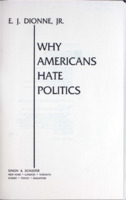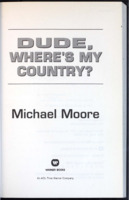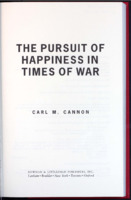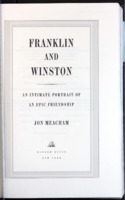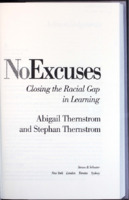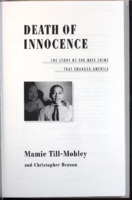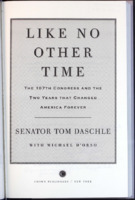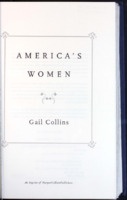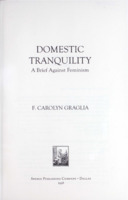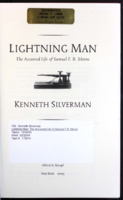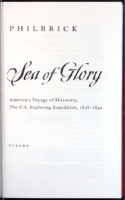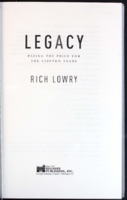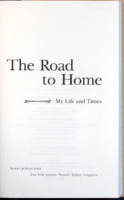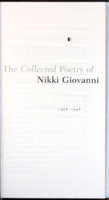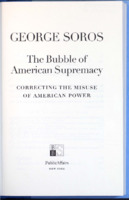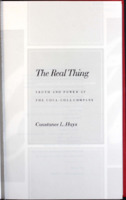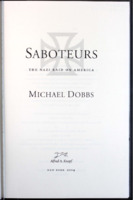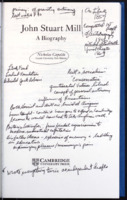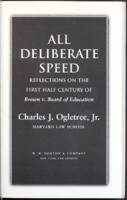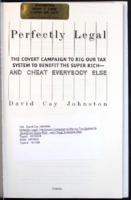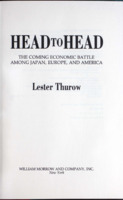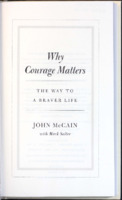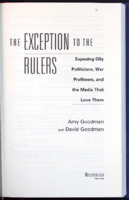Search
540 items
-
Why Americans hate politics
Journalist E.J. Dionne of the Washington Post argues that liberal and conservative ideologies since the 1960s have hindered the framing of American issues in ways that would lead to their resolution. -
Dude, where's my country?
Notes George W. Bush's affiliations with Enron and big oil, presenting a tongue-in-cheek plan for ending his political career while charging political leaders with enabling a growing divide between American classes. -
The pursuit of happiness in times of war
In The Pursuit of Happiness in Times of War, Pulitzer Prize-winning journalist Carl M. Cannon shows how the single phrase life, liberty, and the pursuit of happiness" is one of remarkable historical power. From the Revolutionary War to the War on Terrorism, Americans have lived out this creed with the help of their elected leaders, who in times of conflict inevitably hark back to Jefferson's exalted language.Cannon traces the roots of "the pursuit of happiness" and explores how wartime presidents have embraced it for two centuries. He draws on original research and interviews with Presidents Ford, Carter, Bush (41), and Clinton, among others, and has uncovered exactly what this phrase means to these presidents.Cannon charts how Americans' understanding of the pursuit of happiness has changed through the years as the nation itself has changed."--Jacket. -
Franklin and Winston : an intimate portrait of an epic friendship
The most complete portrait ever drawn of the complex emotional connection between two of history's towering leaders. Franklin Roosevelt and Winston Churchill were the greatest leaders of the Greatest Generation. In [this volume, the author] explores the ... relationship between the two men who piloted the free world to victory in World War II. It was a crucial friendship, and a unique one--a president and a prime minister spending enormous amounts of time together (113 days during the war) and exchanging nearly two thousand messages. Amid cocktails, cigarettes, and cigars, they met, often secretly, in places as far-flung as Washington, Hyde Park, Casablanca, and Teheran, talking to each other of war, politics, the burden of command, their health, their wives, and their children. Born in the nineteenth century and molders of the twentieth and twenty-first, Roosevelt and Churchill had much in common. Sons of the elite, students of history, politicians of the first rank, they savored power. In their own time both men were underestimated, dismissed as arrogant, and faced skeptics and haters in their own nations yet both magnificently rose to the central challenges of the twentieth century. Theirs was a kind of love story, with an emotional Churchill courting an elusive Roosevelt. The British prime minister, who rallied his nation in its darkest hour, standing alone against Adolf Hitler, was always somewhat insecure about his place in FDR's affections which was the way Roosevelt wanted it. A man of secrets, FDR liked to keep people off balance, including his wife, Eleanor, his White House aides and Winston Churchill. Confronting tyranny and terror, Roosevelt and Churchill built a victorious alliance amid cataclysmic events and occasionally conflicting interests. Franklin and Winston is also the story of their marriages and their families, two clans caught up in the most sweeping global conflict in history. [In the volume, he] has written [an] account of the most remarkable friendship of the modern age.--Dust jacket. -
No excuses: closing the racial gap in learning
A concerned appraisal of the racial gap in education today cites educational inequalities as a central civil rights issue, highlighting inner-city schools that demonstrate models of educational excellence while suggesting ways that educational problems can be overcome. -
Death of innocence: the story of the hate crime that changed America
Mamie Carthan was an ordinary African-American woman growing up in 1930s Chicago, living under the strong steady influence of her mother's care. She fell in love with and married Louis Till, and while the marriage didn't last, they did have a beautiful baby boy, Emmett. "In August 1955, Emmett was visiting family in Mississippi when he was kidnapped from his bed in the middle of the night by two white men and brutally murdered. His crime: allegedly whistling at a white woman in a convenience story. His mother began a career of activism when she insisted on an open-casket viewing of her son's gruesomely disfigured body. More than a hundred thousand people attended the service. The trial of J. W. Milam and Roy Bryant, accused of kidnapping and murdering Emmett (the two were eventually acquitted of the crime), was considered the first full-scale media event of the civil rights movement." "What followed altered the course of this country's history, and it was all set in motion by the sheer will, determination, and courage of Mamie Till-Mobley - a woman who would pull herself back from the brink of suicide to become a teacher and inspire hundreds of black children throughout the country."--BOOK JACKET. -
Like no other time: the 107th Congress and the two years that changed America forever
Offers an insider's account of the workings of the U.S. government during two extraordinary years of American history, covering the presidential election of 2000, the September 11th terrorist attacks, and corporate scandals. -
America's women : four hundred years of dolls, drudges, helpmates, and heroines
America's Women tells the story of more than four centuries of history. It features a stunning array of personalities, from the women peering worriedly over the side of the Mayflower to feminists having a grand old time protesting beauty pageants and bridal fairs. Courageous, silly, funny, and heartbreaking, these women shaped the nation and our vision of what it means to be female in America. By culling the most fascinating characters, the average as well as the celebrated, Gail Collins, the editorial page editor at the New York Times, charts a journey that shows how women lived, what they cared about, and how they felt about marriage, sex, and work. She begins with the lost colony of Roanoke and the early southern tobacco brides who came looking for a husband and sometimes, thanks to the stupendously high mortality rate, wound up marrying their way through three or four. Spanning wars, the pioneering days, the fight for suffrage, the Depression, the era of Rosie the Riveter, the civil rights movement, and the feminist rebellion of the 1970s, America's Women describes the way women's lives were altered by dress fashions, medical advances, rules of hygiene, social theories about sex and courtship, and the ever-changing attitudes toward education, work, and politics. While keeping her eye on the big picture, Collins still notes that corsets and uncomfortable shoes mattered a lot, too. "The history of American women is about the fight for freedom," Collins writes in her introduction, "but it's less a war against oppressive men than a struggle to straighten out the perpetually mixed message about women's roles that was accepted by almost everybody of both genders." Told chronologically through the compelling stories of individual lives that, linked together, provide a complete picture of the American woman's experience, America's Women is both a great read and a landmark work of history. -
Domestic tranquility : a brief against feminism
Carolyn Graglia argues that contemporary feminist see traditional wives and mothers as their main opponents. -
Lightning man : the accursed life of Samuel F.B. Morse
Profiles Morse as a gifted artist, political prospect, and innovator responsible for the American electromagnetic telegraph, describing the painful defeats that overshadowed his successes. -
Vixi : memoirs of a non-belonger
Sixteen-year-old Richard Pipes escaped from Nazi-occupied Warsaw with his family in October 1939. Their flight took them to the United States by way of Italy, and Pipes went on to earn a college degree, join the U.S. Air Corps, serve as professor of Russian history at Harvard for nearly forty years, and become advisor to President Reagan on Soviet and Eastern European affairs. In this book, the eminent historian remembers the events of his own remarkable life as well as the unfolding of some of the twentieth century's most extraordinary political events. "Pipes shows us the inner workings of Harvard University during its Golden Age, discusses the nature of Soviet Communism during the Cold War years, and describes from an insider's perspective the conflicts within the Reagan administration over American policies toward the USSR. He offers portraits of such cultural and political figures as Isaiah Berlin, Ronald Reagan, and Alexander Haig, as well as unique observations on his Polish homeland, Jewish heritage, and the process of assimilation into American culture. Perhaps most interesting of all, Pipes depicts his evolution as a historian and his understanding of how history is witnessed and how it is recorded."--BOOK JACKET. -
Sea of glory : America's voyage of discovery : the U.S. Exploring Expedition, 1838-1842
In 1838, the U.S. government launched the largest discovery voyage the Western world had ever seen-6 sailing vessels and 346 men bound for the waters of the Pacific Ocean. Four years later, the U.S. Exploring Expedition returned with an astounding array of accomplishments and discoveries: 87,000 miles logged, 280 Pacific islands surveyed, 4,000 zoological specimens collected, including 2,000 new species, and the discovery of the continent of Antarctica. And yet at a human level, the project was a disaster-not only had 28 men died and 2 ships been lost, but a series of sensational courts-martial had also ensued that pitted the expedition's controversial leader, Lieutenant Charles Wilkes, against almost every officer under his command. Though comparable in importance and breadth of success to the Lewis and Clark Expedition, the Ex. Ex. has been largely forgotten. Now, Nathaniel Philbrick re-creates this chapter of American maritime history in all its triumph and scandal. Sea of glory combines meticulous history with spellbinding human drama as it circles the globe from the palm-fringed beaches of the South Pacific to the treacherous waters off Antarctica and to the stunning beauty of the Pacific Northwest, and, finally, to a court-martial aboard a ship of the line anchored off New York City. -
Legacy : paying the price for the Clinton years
Assesses the Clinton legacy, arguing that it was his appeasement of America's enemies overseas that will be the longest lasting effect of the Clinton years, not his domestic accomplishments. -
The road to home: my life and times
Vartan Gregorian's tale starts with a childhood of poverty, deprivation, and enchantment in the Armenian quarter of Tabriz, Iran. As the world reeled from depression into six years of warfare, his mother died, leaving his grandmother Voski as the loving staff of his life. Through unlettered example and instruction, he learned about the first of his many worlds: the strenuousness required for survival, the fairy tale that explained existence, the place and name of his own star in night sky, how to maneuver as a member of a Christian minority in a benevolent Muslim kingdom, the beauty and inspiration of Armenian Church liturgy, the exciting foreign world of ten-year-old American westerns, the richness of life on the streets. "He learned the magic of the innumerable worlds he could find in books - and he wanted to visit them all. As the spell books cast on him grew more powerful, so did the constraints imposed by his father's indifference to his dreams of redirecting his life through learning." "So, one day when he was fifteen years old, he presented himself at an Armenian-French lycee in Beirut, Lebanon, to start the arduous task of becoming a person of learning and consequence." "This book tells not only how he reached that school but also about the many people who guided, supported, taught, and helped him on a journey from Tabriz to Beirut to Palo Alto to Tenafly to London, from Stanford University to San Francisco State University to the University of Texas at Austin to the University of Pennsylvania to the New York Public Library to Brown University, and, currently, to the presidency of Carnegie Corporation of New York."--BOOK JACKET. -
The collected poetry of Nikki Giovanni, 1968-1998
For the first time ever, the complete poetry collection spanning three decades from Nikki Giovanni, renowned poet and one of America's national treasures. When her poems first emerged during the Black Arts Movement, in the 1960s, Nikki Giovanni immediately took her place among the most celebrated, controversial and influential poets of the era. Now, more than thirty years later, Giovanni still stands as one of the most commanding, luminous voices to grace America's political and poetic landscape. -
The bubble of American supremacy : correcting the misuse of American power
Presents an analysis of the Bush Administration's policy in Iraq, arguing that the Iraqi invasion has eroded the basic values of America at home and hurt its standing in the world. -
An end to evil : how to win the war on terror
Two foreign policy experts examine the continuing threat of terrorism, discussing the crisis with North Korea, the status of the intelligence community and military, and what the U.S. needs to do to protect itself. -
The real thing : truth and power at the Coca-Cola Company
Publisher's description: The Real Thing is a portrait of America's most famous product and the men who transformed it from mere soft drink to symbol of freedom. The story, starting with Coke's creation after the Civil War and continuing with its domination of the domestic and worldwide soft-drink business, is a uniquely American tale of opportunity, hope, teamwork, and love, as well as salesmanship, hubris, ambition, and greed. By 1920, the Coca-Cola Company's success depended on a unique partnership with a group of independent bottlers. Together, they had made Coke not just a soft drink but an element of our culture. But the company, intent on controlling everything about Coke, did all it could to dismantle that partnership. In its reach for power, it was more than willing to gamble the past. Constance L. Hays examines a century of Coca-Cola history through the charismatic, driven men who used luck, spin, and the open door of enterprise to turn a beverage with no nutritional value into a remedy, a refreshment, and the world's best-known brand. The story of Coke is also a catalog of carbonation, soda fountains, dynastic bottling businesses, global expansion, and outsize promotional campaigns, including New Coke, one of the greatest marketing debacles of all time. By examining relationships at all levels of the company, The Real Thing reveals the psyche of a great American corporation and how it shadows all business, for better or worse. This is as much a story about America as it is the tale of a great American product, one recognized all over the world. Under the leadership of Roberto Goizueta and Doug Ivester, Coca-Cola reinvented itself for investors, spearheading trends such as lavish executive salaries and the wooing of Wall Street, but when Coke's great global ambitions ran into trouble, it had difficulty getting back on track. The Real Thing is a journey through the soft-drink industry, from the corner office to the vending machine. It is also a social history in which sugared water becomes an international object of consumer desire--and the messages poured upon an eager public gradually obscure the truth. -
Saboteurs : the Nazi raid on America
Publisher's description: Shortly after America's entry into World War II, Adolf Hitler ordered an extensive sabotage campaign against the United States to disrupt the production of tanks and airplanes and blow up bridges and railroads. Eight German saboteurs were dispatched across the Atlantic by U-boat, one team landing in Amagansett, Long Island, the other near Jacksonville, Florida. They brought with them enough money and explosives for a two-year operation and traveled inland to explore potential targets. The full story of this audacious endeavor is a remarkable account of a terrorist threat against America. Michael Dobbs describes the saboteurs' training in Nazi Germany, their claustrophobic three-week voyage in submarines, and their infiltration into American life. He explores the reasons each volunteered, and their links to a network of Nazi sympathizers in the United States. He paints a portrait of the group's leaders: George Dasch, a onetime waiter who dreamed of leaving his personal mark on history, and Edward Kerling, a fanatic Nazi caught between his love for his mistress and his love for his wife. And he shows how the FBI might never have captured the saboteurs had one of them not helped J. Edgar Hoover transform a hapless manhunt into one of his proudest accomplishments. A military tribunal, a historic Supreme Court session, and one of the largest mass executions in American history provide a stunning climax to a dangerous but failed mission. -
John Stuart Mill : a biography
Nicholas Capaldi's biography (no competitor is currently in print) traces the ways in which Mill's many endeavors are related and explores the significance of Mill's contributions to metaphysics, epistemology, ethics, social and political philosophy, the philosophy of religion, and the philosophy of education. He shows how Mill was groomed for his role in life by both his father, James Mill, and Jeremy Bentham, the two most prominent philosophical radicals of the early nineteenth century. Yet Mill revolted against this education and developed friendships with Thomas Carlyle and Samuel Taylor Coleridge, who introduced him to Romanticism and political conservatism. "A special feature of this biography is the attention devoted to the relationship with Harriet Taylor. No one exerted a greater influence on Mill than the woman he was eventually to marry. Nicholas Capaldi reveals just how deep her impact was on Mill's thinking about the emancipation of women. Clarifying this relationship helps to explain why Mill was concerned not only with such issues as the franchise and representation, but also with a fundamental concept of personal autonomy that became pivotal to his thought." "There has never been a serious attempt to set out the interconnections of Mill's thought in this manner. Moreover, this biography presents the private life as both a reflection and an instantiation of ideas and values - a life so constructed as to be a Romantic work of art."--Jacket. -
All deliberate speed : reflections on the first half century of Brown v. Board of Education
A Harvard Law School professor examines the impact that Brown v. Board of Education has had on his family, citing historical figures, while revealing how the reforms promised by the case were systematically undermined. -
Perfectly legal : the covert campaign to rig our tax system to benefit the super rich-- and cheat everybody else
Details the government's failure to reform tax policies and enforcement. -
Head to head : the coming economic battle among Japan, Europe, and America
Discusses the three major world powers and the competition for world economic supremacy. -
Why courage matters : the way to a braver life
A reflection on courage presents a collection of stories of surpassing bravery and selfless devotion to duty and offers portraits of individuals--both famous and unheralded--who confronted adversity and triumphed. -
The exception to the rulers : exposing oily politicians, war profiteers, and the media that love them
A journalist takes a look at the corporate and political hypocrisy that is rampant in the United States, commenting on the corruption of media monopolies, the deceptions of the Bush administration, and corporate influence on government.
